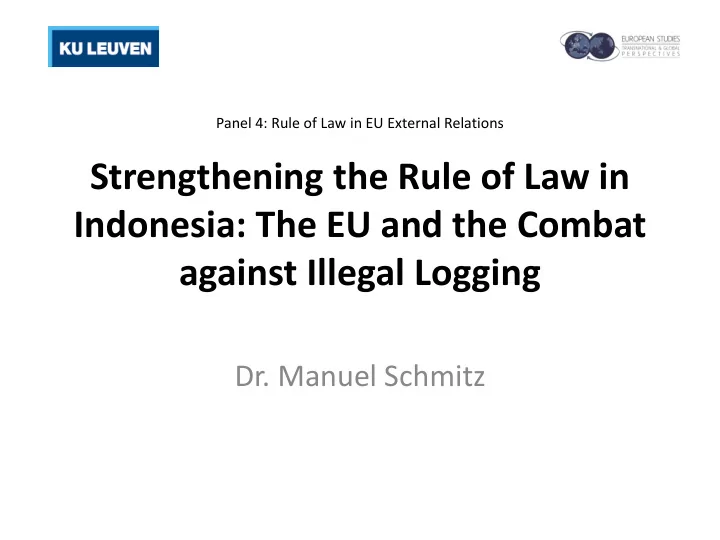

Panel 4: Rule of Law in EU External Relations Strengthening the Rule of Law in Indonesia: The EU and the Combat against Illegal Logging Dr. Manuel Schmitz
The Problem: Rainforests and Corruption in Indonesia Rainforests: • third largest in the world • coverage fallen from 80% (1950) to 49% (2011) • between 500.000 and 1.5 million hectares lost per year • „rainforest disaster area “ • around 40% of wood is logged illegally
The Problem: Rainforests and Corruption in Indonesia Corruption: • rank 114 out of 177 countries (Transparency International) • country scores 32 on a scale from 0 (highly corrupt) to 100 (very clean) • Korrupsi, Kollusi, Nepotisme (KKN)
Part of the Solution: FLEGT VPA (“Timber Pact”) Breaking the chain: corruption > illegal logging > deforestation What is the Timber Pact? • Bilateral treaty between the EU and Indonesia on forest governance • The focus is on illegal logging • Part of the EU FLEGT Action Plan
Part of the Solution: FLEGT VPA (“Timber Pact”) What is FLEGT? • F orest L aw E nforcement, • G overnance and • T rade
Part of the Solution: FLEGT VPA (“Timber Pact”)
Research Question The burden of transforming its forest governance falls upon Indonesia. Indonesia conforms to European norm concepts. Why was it possible for the EU to export its norms? What conditions allowed for such an influence on Indonesia or, to be more precise, on the Indonesian government?
Theoretical perspectives Focus on the norm receiver, the demand side Literature on norm diffusion can be divided into rationalist and constructivist perspectives. Rationalist perspective: material conditions and interests Constructivist perspective: immaterial conditions and norms My approach: bridging rationalist and constructivist accounts
Rationalist Perspective: Material Conditions Theoretical Assumptions: Rational choice institutionalism argues that cost/benefit calculations of strategic agents influence the acceptance, or downloading, of external norms. Mechanisms of norm diffusion: coercion and competitive norm diffusion Economic and political interests are the key to understand norm acceptance.
Rationalist Perspective: Material Conditions Economic interests: • Economic asymmetry in the relation between the EU and Indonesia • The Timber Pact is not reciprocal, it is not about mutual market access • Timber Regulation threatens Indonesia’s share in Europe’s timber market • The Timber Industry is of importance for Indonesia’s economy. The EU was in a position of strength!
Rationalist Perspective: Material Conditions Economic interests: Indonesian timber industry in 2011: • $21 billion or 3.5% of GDP • 3.7 million employees • 1.3% of total tax revenue European market in 2011: • $ 1.2 billion • 15% of Indonesian exports
Rationalist Perspective: Material Conditions Political interests: The FLEGT VPA was part of an attempt by the central government to regain political control lost due to decentralisation. Attempts to regain control: • Basic Forestry Law 2002 • Presidential decrees 2004 • 2003 – 2009 Timber Legality Assurance System (SVLK) • since 2005: negotiations of Timber Pact
Rationalist Perspective: Material Conditions Political interests: • The FLEGT VPA thus suited the domestic agenda of the Indonesian government. • “We have been exploited to a certain extent” • “They made an assessment that they needed allies, otherwise they would lose out. They did not have much credibility and the whole VPA process raised their profile within the government, because it meant that this Ministry was having an international agreement bringing in trade. Even as far as the president, he was aware of what was going on. That was their calculation.”
Constructivist Perspective: Immaterial Conditions Theoretical Assumptions: Norm diffusion from one society to the other, norm export, depends on the normative setting in the target state If there is a cultural match between societies norm export becomes easier. But cultures are not static and it is therefore possible that domestic agents engage in “matchmaking” between outside- and inside- norms, thereby “localizing” the norm .
Constructivist Perspective: Immaterial Conditions What kind of norm is “fight illegal logging”? The norm can be understood in various contexts: • rule of law • environmental protection • social and minority rights of forest communities • economic activities • .…
Cultural match? NO YES • group-orientation • Tradition of Islamic law with the adherence to • hierarchy-acceptance written rules • emphasis on social • Dutch Beamtenstaat harmony • negara hukum • decades of corrupt rule • high salience of anti- • patronage system of corruption policies bapakisme
Constructivist Perspective: Immaterial Conditions Despite the importance of anti-corruption efforts in Indonesian politics the FLEGT VPA was not framed by domestic actors as a rule of law issue. Nor did domestic actors frame it as an environmental issue or minority rights issue. The dominant theme was: The FLEGT VPA is in the national economic interest of Indonesia.
Constructivist Perspective: Immaterial Conditions The emphasis on economic advantages for the nation fits the Indonesian value system well: • nationalism is the defining normative concept • sovereignty and non-interference are central • Indonesia is a post-colonial society Any norm diffusion from Europe to Indonesia is therefore only acceptable if it is framed to be in the national interest of Indonesia.
Constructivist Perspective: Immaterial Conditions Establish good governance Improve the rule of law Tackle corruption Fight illegal logging
Constructivist Perspective: Immaterial Conditions Foster economic develop. Make profits Escalate legal logging Fight illegal logging
Conclusion: Material conditions that allowed norm diffusion: • weak bargaining position of the target state • substantial economic interests of the target state • domestic agenda of governmental actors Immaterial conditions that allowed norm diffusion • norm interpretation/reconstruction by domestic actors
Recommend
More recommend